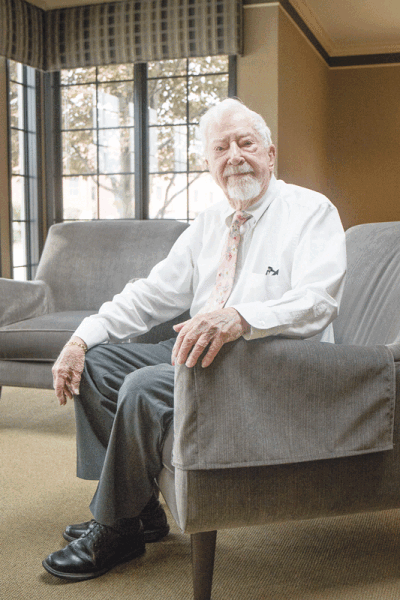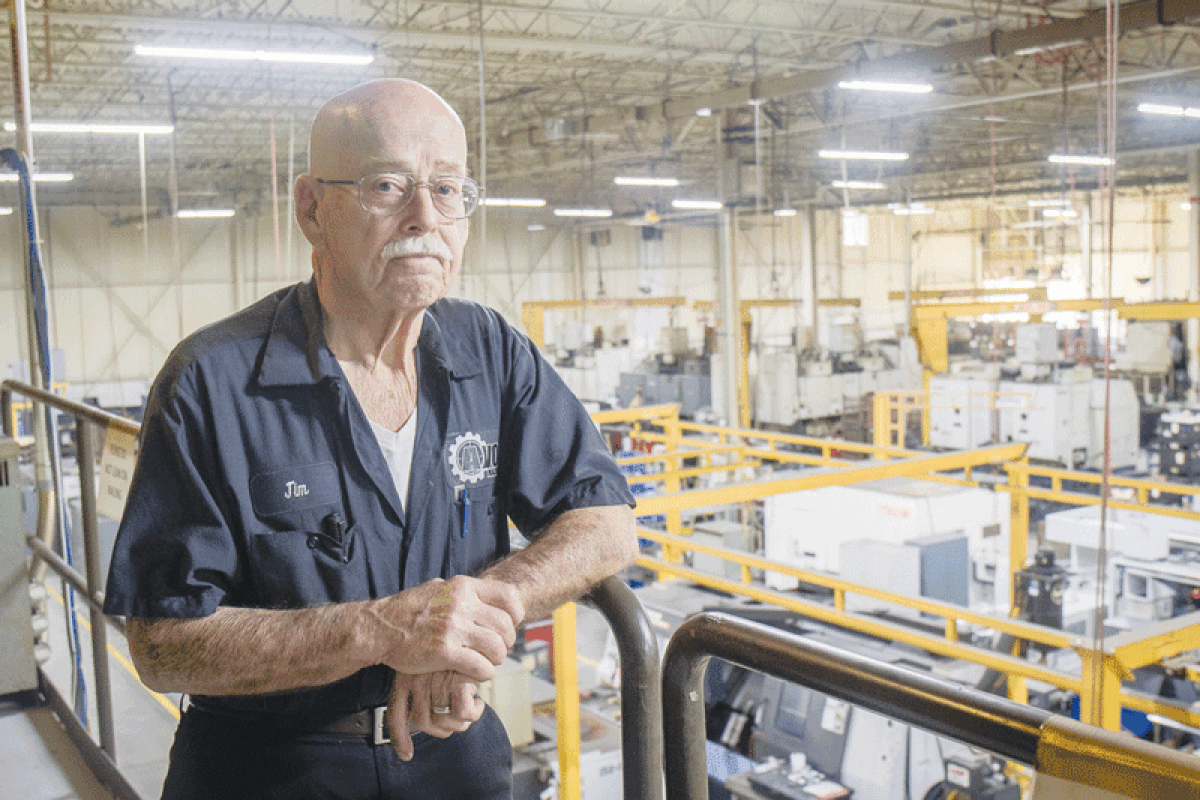
Dick McLaughlin, 100, has worked as a funeral director at Wm. Sullivan & Son Funeral Directors in Royal Oak for the last 70 years and has no plans to quit.
Photo by Patricia O’Blenes
METRO DETROIT — The majority of people look forward to retirement somewhere around the age of 65. However, for some, retirement is simply a boring separation from a career they love, and thus they choose to forgo it.
“(Working) wants you to stay alive,” said Dick McLauglin, of Macomb Township. “You have that feeling of, ‘Oh, I’ve done enough. I can sleep in this morning.’ But you get up, you know, and get going, and that’s what I like.”
At the ripe young age of 100, McLaughlin works an average 20 hours a week over five days as a funeral director and pre arrangement counselor at Wm Sullivan & Son Funeral Directors in Royal Oak, where he has worked since 1953. McLaughlin said he retired for two weeks in 1988 but was so bored that he jumped at the chance to return to his job after the owner asked him to return.
“You burn your duff off sitting at the house,” said McLaughlin.
“I stood out there on my deck and said to my wife, ‘I wonder what I can do. I can’t play golf every day,’ and honest to God, John (Sullivan) called me the next day and says, ‘Dick, you want to come back to work?’ I says, ‘Yeah,’” McLaughlin recalled with a chuckle.
He said he loves his job as it allows him the opportunity to take care of people in their hour of need.
“Just taking care of people when they are in so much trouble mentally, usually, and just taking care of them … it just catches you when you did something satisfactory. You want to stay,” said McLaughlin. “You’re helping people get through a bad time, you know, and it’s just really a good thing.”
According to McLaughlin, his job also helps him retain a youthful mentality, and he enjoys the company of “young” people. He said he is only as old as the person he is with.
“When I’m with you, I’m your age. When I’m with her, I’m her age. I don’t get any older than what you are, you know,” said McLaughlin. “And there’s a lot of young people working here.”
“Love what you’re doing,” McLaughlin said he would advise others. “If you love what you’re doing and helping people, it’s a big thing, you know. And they always remember you.”
Mclaughlin attributes his longevity to “the Good Lord.” He said he has survived World War II, when he served in the U.S. Army for three years as a court reporter from 1943-1945 in Japan and the South Pacific. He left with the rank of corporal. He said he has also survived cancer, a heart attack, and a stroke.
McLaughlin said his family thinks he has worked enough. However, he said he completely disagrees. He said he doesn’t know what he’d do without his job. He says having a job allows seniors such as himself to stay busy and keep out of trouble.
Mike Lope, the co-owner of Wm Sullivan & Son Funeral Directors, describes McLaughlin as “unbelievable.” Lope said McLaughlin has worked with every funeral director and owner of Sullivan & Son — including his great-grandfather, who founded the business in 1906 — and is well known in the industry.
“It starts with his character,” said Lope. “He has always put families first. So, in this line of work you have to be good with the rest of the staff, but he’d always put the families and the community first. When you have that person, you don’t want to lose them. Around the building, it’s his sense of humor, embracing the rest of the staff sort of like family. … He’s just a special guy. He always has been. He’s been a mentor to all the younger people. He’s always been good at what he does from the funeral director side, but also management and making sure that the staff understands what they’re doing. It’s always good to have him around, and we’ll keep him around as long as he wants to be here.”
According to Lope, McLaughlin has always said that without the job, he doesn’t know if he’d still be alive. Lope said he believes that having the job keeps McLaughlin alive and keeps him going as it gives him something to do.
“It’s kept him really sharp. Coming in to work and putting a suit on and being with individuals out in the community on funerals, meeting with them for their needs. And he’s just sort of like a perfect example of the fact that you don’t have to stop working. You can keep working and do it on your terms,” said Lope.
Mclaughlin is not the only one working well into his golden years. James Huntley Sr., 80, of Roseville, continues to work as a machine repairman at Avon Machining in Shelby Township, even after suffering a heart attack on the job in November.
“I just love working. I love the people I work with, work for. They treat me fine. … I just love coming to work,” Huntley said. “I was home for them 10 weeks. I could tell you every car and what time of day that was coming up and down the street, because I couldn’t do nothing. It was crazy. I can’t shovel snow. I can’t cut grass. I can’t cut branches down. I can’t do anything. So, in 79 years I have been working with these hands. Still got all 10 fingers. But I can’t stop working.”
Huntley recalled that his doctor had wanted him to retire after the heart attack, but Huntley told him no. They compromised on 24 hours a week, but after working four weeks at part-time hours, he insisted that his doctor let him return to full-time duties, and he now works 40 hours a week.
Huntley’s advice to workers is to find a career they enjoy.
According to Melissa Brown, of Avon Machining, the company offers phased retirement. Phased retirement allows retirement-age employees the opportunity to create a schedule that they want to adhere to. She said this enables the employees to work while technically retired, allowing them to earn extra money while mentoring younger employees. However, she said those who partake in the program don’t typically work 40 hours a week.
Brown described Huntely as the hardest working person at the company.
“Oh my gosh, he never ever stops moving from the time he gets here,” she said. “He is always working. He is always finding something to do.”
“Jimmy outworks anybody in this place. Anybody,” said John Binkowski, a machinist who works on Huntely’s team.
“He outworks our 20-year-olds,” added Brown.
“Except me. He busts my tail, let me tell you. And I love it, cause the days go by fast, but he doesn’t stop. He’s a go-getter, and he loves this job. He’s ornery, funny and very hard working,” said Binkowski.
Both Huntley and McLaughlin still drive themselves to and from work, which for both men is an approximately 45-minute commute. They both joked that they continued to work because they are/were married, as they spoke of their wives with found regard.
According to Lope, it is quite common in the funeral industry to hire seniors for positions such as funeral assistant. In fact, he said, they actually solicit seniors for the positions, because of their experience and connections in the community, and willingness to be flexible with schedules. He said the assistants usually work 10 to 20 hours per week. Lope said that it has proved to be beneficial for both the seniors and the funeral home because of the flexibility offered and needed by the positions.
“We do get some seniors coming to work with us because of the flexibility, the hours,” said Lope. “We’re very flexible as far as when people want to be here and how much time they want to spend here. … It is something that I think has worked out well. It is one of those things that people say is mutually beneficial.”
He said that between the two Sullivan & Son locations, in Royal Oak and Utica, they currently have close to a dozen employees over the age of 65, and while a few — including his father, his uncle and McLaughlin — are actually funeral directors, many have come into the industry as a second career. Often, the seniors are retired firefighters, police officers, nurses, pastors, etc. Lope said they often find their senior employees through their community connections with schools, churches and events. He said that, generally, someone will simply tell them they are interested in some extra work, and they don’t typically have to advertise for the positions.
According to Lope, funeral assistants are critical to their organization, doing things such as helping to direct people to where they need to go, and assisting families during visitations and other tasks during funeral services, such as bringing flowers or caskets into the parlor, church or cemetery.
“We always look for folks that are good in the community and understand what we’re doing and trying to do,” said Lope. “Most of them are, I would guess, late 60s to mid 70s. So, somewhere between 65 and 80, but still super useful in the fact that they’re all very sharp communicators and able to do what they need to do. … Over the years they’ve been a group of people we look to hire. They’ve been very helpful. … They become very polished and very understanding of what families need and what their expectations are and what funeral service is all about. It’s been a great fit for us. … It’s really kind of a cool gig for a lot of the seniors that work with us.”
Binkowski summed up some of the admiration: “Just that they’re that age and they’re still sharp, when I forgot my keys coming in.”
 Publication select ▼
Publication select ▼





























